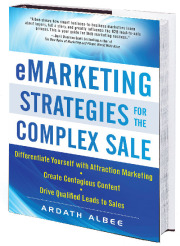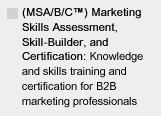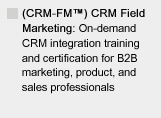MAKE SURE YOU CONTINUE TO RECEIVE EACH ISSUE OF TUESDAY MARKETING NOTES—CLICK HERE TO RENEW YOUR FREE SUBSCRIPTION (IF YOU'VE ALREADY SUBSCRIBED, NO NEED TO RE-SUBSCRIBE)

Prospect Intelligence is a Terrible Thing to Waste
Ardath Albee, Marketing Interactions

It always amazes me when I click to download a white paper or register for a Webinar and am confronted by a 20-field lead generation form. Unless it's something I want very badly, I tend to click the back button and move on to something more appealing. Then again, I'm a marketer, so sometimes I fill out the form to see what the company will do in response. I have to say that I'm rarely surprised by something amazing and unexpected.
I bet I've submitted my contact information close to fifty times during the last year. Maybe more. I do a lot of research for client projects.
I've never received one direct mail piece from being required to fill out my street address.
I've received a few phone calls from inept people who had no real idea why they were calling me, except to see if I wanted to buy. In fact, not many of them that I remember even knew what interaction I'd had with the company, just that I'd had one.
What I do get is a bunch of garbage e-mails. You know what I'm talking about. Company-focused feeds and speeds and pablum that I could care less about.
Although they've asked for my title on the form, most of the stuff I get has no relation to my role or responsibilities.
Although they know what I downloaded or registered for (they should), quite often the follow-on communications have no recognizable connection to my expressed interest.
Most forms ask for my company name, some of them my Web site URL. But, beyond occasionally having my company name pre-fill a field within the text of the email, they don't use it to learn anything about me or my company. The offers are so ridiculous that it's obvious they never used the URL information either. Even if the text says they've "browsed my Web site and want to discuss how their [product, solution, services] can help me" attain success by using whatever it is they're selling—that's generally not true.
My favorite thing on a form is the dropdown where I can choose "just researching." The sad part about that field is that companies use it as a way to eliminate the effort expended on their part to get to know me better. It eliminates the ridiculous sales follow-up, but what if it was used to make sure that I know about every new white paper or report they produce with related information? Why do companies assume that when I'm researching, I only need that one piece?
Here comes a radical idea: What if forms were designed with the prospect in mind?
What if forms asked questions that actually helped companies learn more about their audience so they can create better, more relevant content?
What if a rule was made that every field of information collected had to be used to generate something valuable for gaining more prospect attention, creating interactions and propelling conversational opportunities?
Some possibilities are:
• In addition to reading this white paper, I'd be interested in reading...[drop down list of other related content];
• My biggest concern in relation to [the "offer's" topic] is [list of choices];
• I'd like information about how to talk to my [boss, CIO, end users, VP of...] about how [this topic] could impact them;
• I'd be interested in knowing about how this topic is impacting this industry [list of choices]
Those are just a few ideas. But, start thinking about how you can put that kind of intelligence to work. It's a prospect and customer-driven marketplace. What are you doing to make sure your company has its focus in the right place?
Introducing Ardath Albee's New Book,
eMarketing Strategies for the Complex Sale

|
A comprehensive guide to help marketers drive decisions to buy in their favor.
Power your eMarketing results by mastering how to:
• Build a foundation for eMarketing strategies based on buyer perspectives;
• Use a buyer synopsis to develop personalized content;
• Transform prospect engagement with natural nurturing;
• Create a contagious content structure for competitive differentiation;
• Generate increased pipeline with attraction marketing;
• Facilitate faster prospect progression to sales readiness;
• Perfect the transition of sales-ready leads to your sales force;
• Measure the impact of eMarketing programs against business objectives
To visit this book's Web site, click here . . . |
Ardath Albee (Ardath@marketinginteractions.com) is an expert at creating contagious content and e-marketing strategies that engage prospects-from initial attention until they're sales ready. She has a unique ability to develop content strategies that work hand-in-glove with overall corporate and product positioning to deliver hard hitting e-marketing programs and tools that compel customers to buy. Ardath helps her clients generate more opportunities by optimizing how they leverage marketing automation and CRM technology investments. Her clients include Covad Communications, LANDesk and Silicon Graphics. Visit her website and industry-leading blog to learn more: www.marketinginteractions.com.










